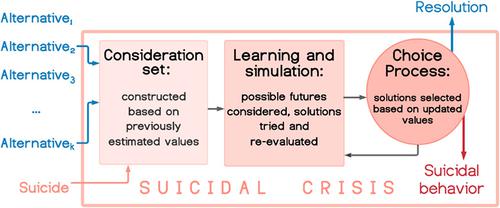当前位置:
X-MOL 学术
›
WIREs Cogn. Sci.
›
论文详情
Our official English website, www.x-mol.net, welcomes your feedback! (Note: you will need to create a separate account there.)
Search for solutions, learning, simulation, and choice processes in suicidal behavior
WIREs Cognitive Science ( IF 3.9 ) Pub Date : 2021-05-18 , DOI: 10.1002/wcs.1561 Alexandre Y. Dombrovski 1 , Michael N. Hallquist 2
WIREs Cognitive Science ( IF 3.9 ) Pub Date : 2021-05-18 , DOI: 10.1002/wcs.1561 Alexandre Y. Dombrovski 1 , Michael N. Hallquist 2
Affiliation

|
Suicide may be viewed as an unfortunate outcome of failures in decision processes. Such failures occur when the demands of a crisis exceed a person's capacity to (i) search for options, (ii) learn and simulate possible futures, and (iii) make advantageous value-based choices. Can individual-level decision deficits and biases drive the progression of the suicidal crisis? Our overview of the evidence on this question is informed by clinical theory and grounded in reinforcement learning and behavioral economics. Cohort and case–control studies provide strong evidence that limited cognitive capacity and particularly impaired cognitive control are associated with suicidal behavior, imposing cognitive constraints on decision-making. We conceptualize suicidal ideation as an element of impoverished consideration sets resulting from a search for solutions under cognitive constraints and mood-congruent Pavlovian influences, a view supported by mostly indirect evidence. More compelling is the evidence of impaired learning in people with a history of suicidal behavior. We speculate that an inability to simulate alternative futures using one's model of the world may undermine alternative solutions in a suicidal crisis. The hypothesis supported by the strongest evidence is that the selection of suicide over alternatives is facilitated by a choice process undermined by randomness. Case–control studies using gambling tasks, armed bandits, and delay discounting support this claim. Future experimental studies will need to uncover real-time dynamics of choice processes in suicidal people. In summary, the decision process framework sheds light on neurocognitive mechanisms that facilitate the progression of the suicidal crisis.
中文翻译:

寻找自杀行为的解决方案、学习、模拟和选择过程
自杀可能被视为决策过程失败的不幸结果。当危机的需求超过一个人的能力(i)寻找选项,(ii)学习和模拟可能的未来,以及(iii)做出有利的基于价值的选择时,就会发生这种失败。个人层面的决策缺陷和偏见会推动自杀危机的发展吗?我们对这个问题的证据的概述以临床理论为依据,并以强化学习和行为经济学为基础。队列和病例对照研究提供了强有力的证据,证明有限的认知能力,特别是认知控制受损与自杀行为有关,从而对决策施加认知限制。我们将自杀意念概念化为在认知约束和情绪一致的巴甫洛夫影响下寻找解决方案导致的贫困考虑集的一个元素,这一观点得到了大多数间接证据的支持。更有说服力的是有自杀行为史的人学习受损的证据。我们推测,无法使用自己的世界模型模拟替代未来可能会破坏自杀危机中的替代解决方案。最有力证据支持的假设是,选择自杀而不是替代选择是由随机性破坏的选择过程促进的。使用赌博任务、武装匪徒和延迟贴现的病例对照研究支持了这一主张。未来的实验研究将需要揭示自杀者选择过程的实时动态。总之,决策过程框架揭示了促进自杀危机进展的神经认知机制。
更新日期:2021-05-18
中文翻译:

寻找自杀行为的解决方案、学习、模拟和选择过程
自杀可能被视为决策过程失败的不幸结果。当危机的需求超过一个人的能力(i)寻找选项,(ii)学习和模拟可能的未来,以及(iii)做出有利的基于价值的选择时,就会发生这种失败。个人层面的决策缺陷和偏见会推动自杀危机的发展吗?我们对这个问题的证据的概述以临床理论为依据,并以强化学习和行为经济学为基础。队列和病例对照研究提供了强有力的证据,证明有限的认知能力,特别是认知控制受损与自杀行为有关,从而对决策施加认知限制。我们将自杀意念概念化为在认知约束和情绪一致的巴甫洛夫影响下寻找解决方案导致的贫困考虑集的一个元素,这一观点得到了大多数间接证据的支持。更有说服力的是有自杀行为史的人学习受损的证据。我们推测,无法使用自己的世界模型模拟替代未来可能会破坏自杀危机中的替代解决方案。最有力证据支持的假设是,选择自杀而不是替代选择是由随机性破坏的选择过程促进的。使用赌博任务、武装匪徒和延迟贴现的病例对照研究支持了这一主张。未来的实验研究将需要揭示自杀者选择过程的实时动态。总之,决策过程框架揭示了促进自杀危机进展的神经认知机制。


























 京公网安备 11010802027423号
京公网安备 11010802027423号